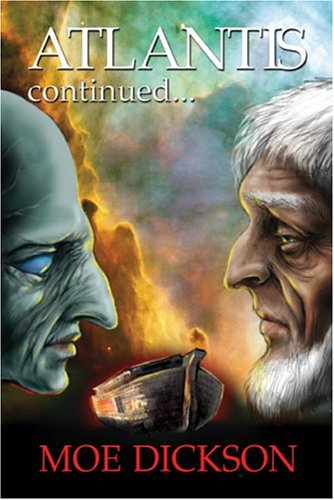- Date: 01.08.2008
- Book: Atlantis Continuedâ€|
- Author: plappen
Review
Atlantis Continued, Moe Dickson, Publish America, 2003Everyone knows that life on Earth started with alien help. This novel shows how it was done.
The planet Atlantis has spent millennia working on other planets throughout the galaxy, helping their native civilizations to survive and thrive. For various reasons, the planet Earth was passed over seven times in the past. Finally, approval was given and an observation base was set up on the far side of Earths moon.
First of all, Earths orbit and atmosphere had to be stabilized, with help from meteors that were made to hit the planet. Atlanteans are a very long-lived species; life spans of several hundred years are common. To a human, Atlanteans might as well be immortal. It was hoped to slow down Earths orbit to the point where five Earth years would equal one Atlantean year.
As time goes on, the Atlanteans realize that humans are not like the other species they have encountered in the past. Humans have this very surprising need for procreation, which might go along with their short (to an Atlantean) life span. Occasionally, an Atlantean will go native, spending years among a certain group of people. At one point, a group of Atlanteans spend a large amount of time procreating with humans, creating a group of human/alien half-breeds, a potential disaster. For the Atlanteans, it almost reaches the point of hoping that Earth doesnt (figuratively) explode.
The various civilizations that have risen and fallen on Earth have all been influenced by the aliens (Sumer, Akkad, Egypt, Crete, etc). Among the people who have met the aliens are Noah (whose descendants populate much of that part of the world), Sargon, Socrates and Abram. The book ends with a ship being sent from Atlantis to see just what has been happening. They are disgusted by much of what they find, especially two Earth cities that are full of immorality and contagious disease, cities that must be dealt with. The cities are Sodom and Gomorrah.
Ancient history enthusiasts will love this book; as much as possible, it is based on actual history. For everyone else, this story belongs somewhere in the large gray area of Pretty Good or Worth Reading. The reading is a little on the slow side, but it is worth the readers time.
Recent actions
-
toryah1988 has added Harry Potter And The Order Of The Phoenix to their read list.
-
toryah1988 has added Harry Potter And The Goblet Of Fire to their read list.
-
toryah1988 has added Atonement to their read list.
-
toryah1988 has added New Moon (The Twilight Saga) to their read list.
-
Monica has added The Da Vinci Code (Large Print) to their wish list.
